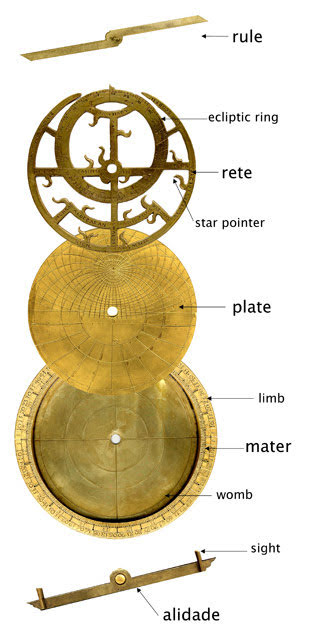Identify 1 factor that led to the growth of Silk Road trade networks in the 1200-1450 time period.
1. Rise of the Mongol Empire
2. New money economies
3. Advancement in technologies that allowed for safer travel
Ghenghis Khan

This device assisted sailors when it came to navigating the seas. Using the picture above, what device is it?
An astrolabe
Explain the various factors that led to the growth of the Trans-Saharan trade networks in the 1200 - 1450 time period.
The growth of interregional trade was encouraged by innovations in existing transportation technologies. Caravan travel, camel saddle, magnetic compass
Give 1 example of cultural transfers that occurred as a result of trade networks in the 1200-1450 time period:
The influence of Buddhism in East Asia
The spread of Hinduism and Buddhism into Southeast Asia
The spread of Islam in sub-Saharan Africa and Asia
Explain why only luxury goods were traded along the Silk Roads
The journey along the roads was dangerous, so only materials that yielded high profits were worth transporting.
The consumers of the Silk Road were wealthy elites throughout Afro-Eurasia, so only the elites could afford payments for expensive goods
What is a khanate
A khanate is a kingdom that was created by the Mongols.
Explain how the Indian Ocean Trade Network spread culture throughout its trade system.
- Spread of Islam along the East African coast
- diasporic communities (Muslims in Indian Ocean, Chinese culture in SE Asian islands)
Give 1 example of the diffusion of scientific/technological innovations that occurred as a result of trade networks in the 1200-1450 time period.
Gunpowder from China
Paper from China
astrolabe
magnetic compass
lateen sail
camel saddle
Identify 2 transportation technologies that facilitated trade along the Silk Road
- Caravans
- Magnetic compass
- camel saddle
What happened to the Mongol Empire after the death of Ghenghis Khan?
The Empire split into 4 khanates (kingdoms) each influenced by the cultural, political, and geographic situations. (ie Kublai Khan and the Yuan Dynasty saw cultural diffusion between Mongol and Song Dynasty cultures)
Identify 3 factors that led to the growth of the Silk Roads.
- new technology
- new motivations (expand empires, facilitate trade, new money economies)
What effects did the Trans Saharan Trade Route have on Africa (and the world)?
- spread of culture (Islam)
- more resources to trade
- connected to other trade networks allowing for trade in Afro-Eurasia to grow
Describe some positive environmental effects of the various networks of exchange from c. 1200 to 1450.
Diffusion of crops:
Bananas in Africa
New rice varieties in East Asia
Spread of citrus in the Mediterranean
- knowledge of monsoon winds
Identify one commercial technology that facilitated trade along the Silk Roads.
- new lines of credit
- banking systems
- rise of trade city centers (Kashgar)
Describe one cultural transfer that resulted from the Mongol khanates
- Adoption of Islam in the Mongol Khanate in the Islamic Heartlands
- Increase militarization in various empires to prevent an empire as strong as the Mongols from happening again
- gender tolerance in China under the Yuan Dynasty
What role did environmental factors play in facilitating the growth of the Indian Ocean Trade Network
Knowledge of the Monsoon winds allowed merchants to determine beneficial and detrimental times for sailing.
Describe some negative environmental effects of the various networks of exchange from c. 1200 to 1450.
- epidemic diseases (bubonic plague)
Explain one cause and one effect of the growth of the Silk Roads
What is the connection between the Mongols and the Silk Road
When Ghenghis Khan and the Mongols conquered the Eurasian territories, they enforced trade by rebuilding roads and bridges and making it safe for merchants to travel due to their strict laws on theft.
Describe a diasporic community that resulted from the Indian Ocean trade Networks
- Arab and Persian communities in East Africa
- Chinese merchant communities in Southeast Asia
- Malay communities in the Indian Ocean basin
Explain the connection between Mali in West Africa and trade and communication.
The expansion of empires—including Mali in West Africa–facilitated Afro-Eurasian trade and communication as new people were drawn into the economies and trade networks.